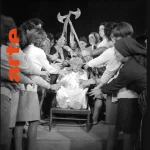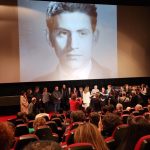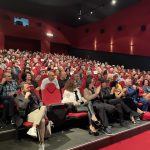| Reference Code | I/2-267 |
| Title | Glorious life |
| Synopsis | Portrait of Karl Marx. A view of the city of Trier in Germany, where he was born on May 5, 1818. The city of Bonn, where he began law school and after a year, in 1836, he went to Berlin to complete his studies in history and philology. Photo of Berlin. Photo of Hegel (German idealist philosopher). Photo of Marx at the age of 25 where he receives the title of Doctor of Philosophy. Marx runs the Rhine newspaper in Cologne. Pursued by the Prussian government, Marx goes to Paris to create a new revolutionary newspaper. Photo of the house where Marx lived in Paris. Portrait of Zheni Marks, Karl’s wife. Photo Marx – Engels. Photo of utopian socialists Thoman Mor, Kompanela, Sen Simon, Shart Furie, Robert Ouren. Photographs of factories, workers participating in strike movements. Police document calling Marx a traitor. Wilhelm’s government ordered the removal of Karl Marx from Paris. Marx fled to Brussels, Belgium. Photo of Brussels and the house where Marx lived. Frederik Engels comes to Brussels to see Marx in 1844. The Communist Manifesto written by Marx and Engels. Photos from demonstrations in Vienna, Prague, etc. Photo of Marx’s arrest in Paris. Marx and Engels on the Rhine in Germany. (279.10m) Photo of Marx in England. After the revolution, his economic situation worsened a lot. Engels goes to Manchester, England and supports economically Marx. Even before coming to England, Engels was always interested in Marx work (Engels’ letter to Zheni Marx from Switzerland). The Cologne trial, which strongly condemned Marx. Marx working on Capital (in the British Museum). In various progressive newspapers, Marx writes about the national liberation war in India, about China, the Russian peasantry, etc. The building in Geneve where the 1st International Congress was held. Since Marx did not take part in the congress, he directed it with instructions and directives. The meeting of the General Council of the International is held in London. Marx takes part in the meeting (the building where the meeting was held). Marx’s notebook on Russia. The first volume of Kapital that was published in Hamburg in 1867. Portrait photo of Marx. Marx’s daughter’s survey completed by him. Year 1870. Photo from the Franco-Prussian war. The appeal of the International written by Marx, regarding the tact of the proletariat, the masses and the Party in this war. Photo from the Paris Commune trump card. Cartoon portrait of Thierri. Photo from the struggles of the communes, in 1871 the Commune of Paris (photo). The city of Samar, Russia, where Lenin was born in 1871, the successor to the works of Marx and Engels. Former leaders of the German working-class August Bebel and Vilhelm Libneti. The founders of the French labour party Jules Ged and Paul Lagergue. The propagandist of Marxism in America, Fridrih Zorge. Portrait of Plehanov. Marx lives and works in London. The house where Marx died on March 14, 1883. Lenin speaking on Marxism and revolution. Tirana, the house where the party was founded. Portrait of Enver Hoxhe. Lenin monument. Views of factories and fields in our country. Reactors in flight. Part of the May 1 parade. The bureau and Enver Hoxha are in the tribune. |
| Awards | |
| Screenwriter | |
| Scriptwriter | Endri Keko |
| Director | Endri Keko |
| Composer | Donika Muci |
| Camera | Xhavit Behri, op/zeri |
| Designer | |
| Editing | |
| Sound | |
| Category | Documentaries |
| Chroma | |
| Year | 1968 |
| Release date | 1968 |
| Reels | 3 |
| Lenght (in minutes) | 24 |
| Country of origin | Shqiperi |
| Shooting locations | |
| Producers | Kinostudio “Shqiperia e re” |
| Notes | |
| © Copyright | Arkivi Qendror Shtetëror i Filmit |
Share This Article




